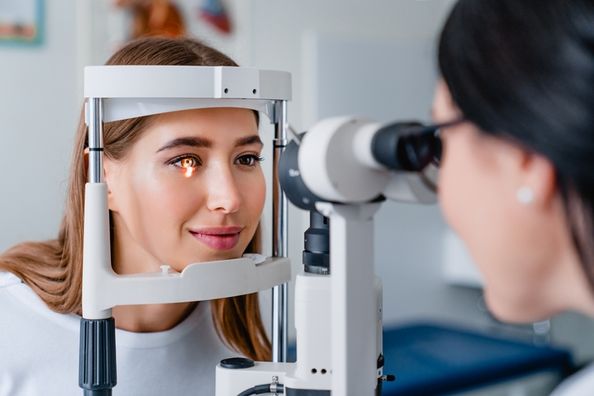The eye is the organ of sight and is best compared to a camera. Like a camera, the eye has many intricate parts which must work together to produce clear vision. The retina, a layer of neural tissue that lines the back surface of the eye, functions like the film in a camera. To produce a clear picture, the film must be defect-free. Similarly, for you to see clearly, your retina must be free of any problems. Unfortunately, many of us do not know we have retinal problems until they impair our vision. The good news is that a dilated eye exam performed by a retinal specialist can identify these problems early, treat if necessary and prevent irreversible blindness.
Diabetic retinopathy is one condition we should all be aware of. It is the leading cause of blindness in the United States in patients 20 to 74 years of age. There are two forms of diabetic retinopathy Non-proliferative and Proliferative retinopathy. Non-proliferative retinopathy occurs when blood vessels leak and fluid accumulates in the retina which can result in visual loss. Proliferative diabetic retinopathy results from ischemia which releases stimulants for the growth or “proliferation” of new blood vessels. These new vessels are fragile and can bleed into the eye. We can treat both of these conditions quite effectively now. In fact, here at DMG we are equipped with a cutting edge laser called the Pascal laser. When compared to traditional single-spot lasers, the Pascal allows us to control the precision of laser treatment, improve safety and efficiency, while optimizing your comfort.
Macular degeneration is another important retinal condition to understand. It is the leading cause of blindness in the United States. It usually affects older patients, but it may be picked up earlier, even in the 40’s and 50’s. This is important because if we identify it early, we can start you on nutritional supplements and life-style changes that can greatly decrease your risk of blindness. There are also two types of Macular degeneration, the dry form and the wet form. The dry form arises from the waste products of vision that build up underneath the retina over time. These product form yellow mounds referred to as drusen. In some patients, abnormal blood vessels sprout from these areas of degenerated retina. We refer to this condition as the wet form of macular degeneration, since these blood vessels can leak and bleed into the retina. However, we now have an injectable medication that has had unprecedented results in treating this type of macular degeneration. If used promptly, we can prevent vision loss in over 95% of our patients.
So what about those flashes and floaters? Flashes and new floaters may signal a sight threatening event such as retinal tear or detachment so if you experience these symptoms, a retinal specialist at DMG will see you immediately. As we age, the vitreous gel, which fills our eye, begins to degenerate into clumps of material which float within the eye. As this is occurring, the gel will separate from the retina and pull on it. This pull stimulates the retina to perceive flashing lights. In some cases, the mechanical pull may be great enough to cause a retinal tear. Retinal specialists can identify a tear, seal it with laser the same day and significantly reduce the chance of a retinal detachment and blindness. So in summary, see your retinal specialist early. It can go a long way in investing in your future sight.
Health Topics:







